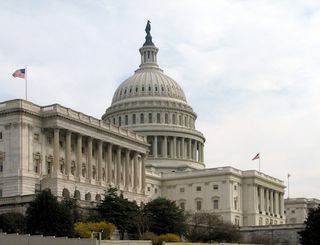Congress Passes Spending Bill with JSA-Grandfathering Rider

The Congress Friday (Dec. 18) passed a massive ($1 trillion-plus) spending package that will keep the government open and funded and, much to broadcasters liking, keep the FCC from requiring joint sales agreements (JSA's) the FCC says violated ownership regs from having to be unwound for another decade.
The final House vote was 316 to 113. The Senate vote was 65 to 33.
The JSA rider was among those that made it through the process--hundreds did not--and onto the final bill. It grandfathers for a 10-yearr period JSA's existing at the time the FCC adopted new rules (March 2014) in a 3-2 politically divided decision making JSAs over 15% of a station's sales attributable as ownership interest, as they are in radio.
The National Association of Broadcasters praised passage.
"NAB salutes the bipartisan leadership of both parties in correcting a punitive regulatory overreach that would have unfairly harmed millions of local television viewers," the association said. "With this action, Congress sends an unmistakable message that it continues to value broadcasting as an indispensable source of news, entertainment and lifeline information every day across America."
Not making the cut were riders from House Republicans that would have prevented the FCC from funding enforcement of its new Open Internet order until the legal challenges to the rules had been resolved, and one that would have prevented those rules from being used to regulate rates.
Among those 113 voting against the bill in the House was Rep. Marsha Blackburn (R-Tenn.), a prominent member of the Communications Subcommittee, who said one reason was the absence of the net neutrality language.
Broadcasting & Cable Newsletter
The smarter way to stay on top of broadcasting and cable industry. Sign up below
Both of those net neutrality riders were poison pills given the President's vocal support of the net neutrality rules and the Administration's threat to veto a bill with "ideological riders," while the JSA-grandfathering rider was distasteful medicine for some, but had some bipartisan backing.
The rider is a victory for broadcasters, who argued that the FCC's March 2014 move to tighten JSA rules to align them with radio were not in the public interest.
It was the second time Congress had stepped in on the JSA issue. In STELAR satellite legislation, broadcasters have been given extra time to unwind the JSAs (until Dec. 31, 2016).
The bill also includes a cybersecurity rider, backed by ISPs, that would give those ISPs and other companies liabity protection for sharing threat information with each other and the government.
CenturyLink praised the inclusion of rider, which was a version of the Cyberecurity Information Sharing Act ISPs had long supported.
“Cyber threats pose significant risks for American consumers and every facet of our nation’s critical infrastructure, economy and financial markets," the company said. "CenturyLink applauds Congress for passing important cybersecurity legislation that will help make government and private sector information systems more secure by promoting the real-time exchange of critical cyber threat information and offering key privacy protections to consumers and businesses. We specifically support provisions that require federal agencies to take advantage of the Department of Homeland Security’s cyber intrusion prevention programs to protect their IT systems.”
A concurrent resolution (CR), had already passed and would have kept the government funded through Dec. 22, but the plan had always been to vote the spending bill today (Dec. 18) if possible.
Contributing editor John Eggerton has been an editor and/or writer on media regulation, legislation and policy for over four decades, including covering the FCC, FTC, Congress, the major media trade associations, and the federal courts. In addition to Multichannel News and Broadcasting + Cable, his work has appeared in Radio World, TV Technology, TV Fax, This Week in Consumer Electronics, Variety and the Encyclopedia Britannica.

